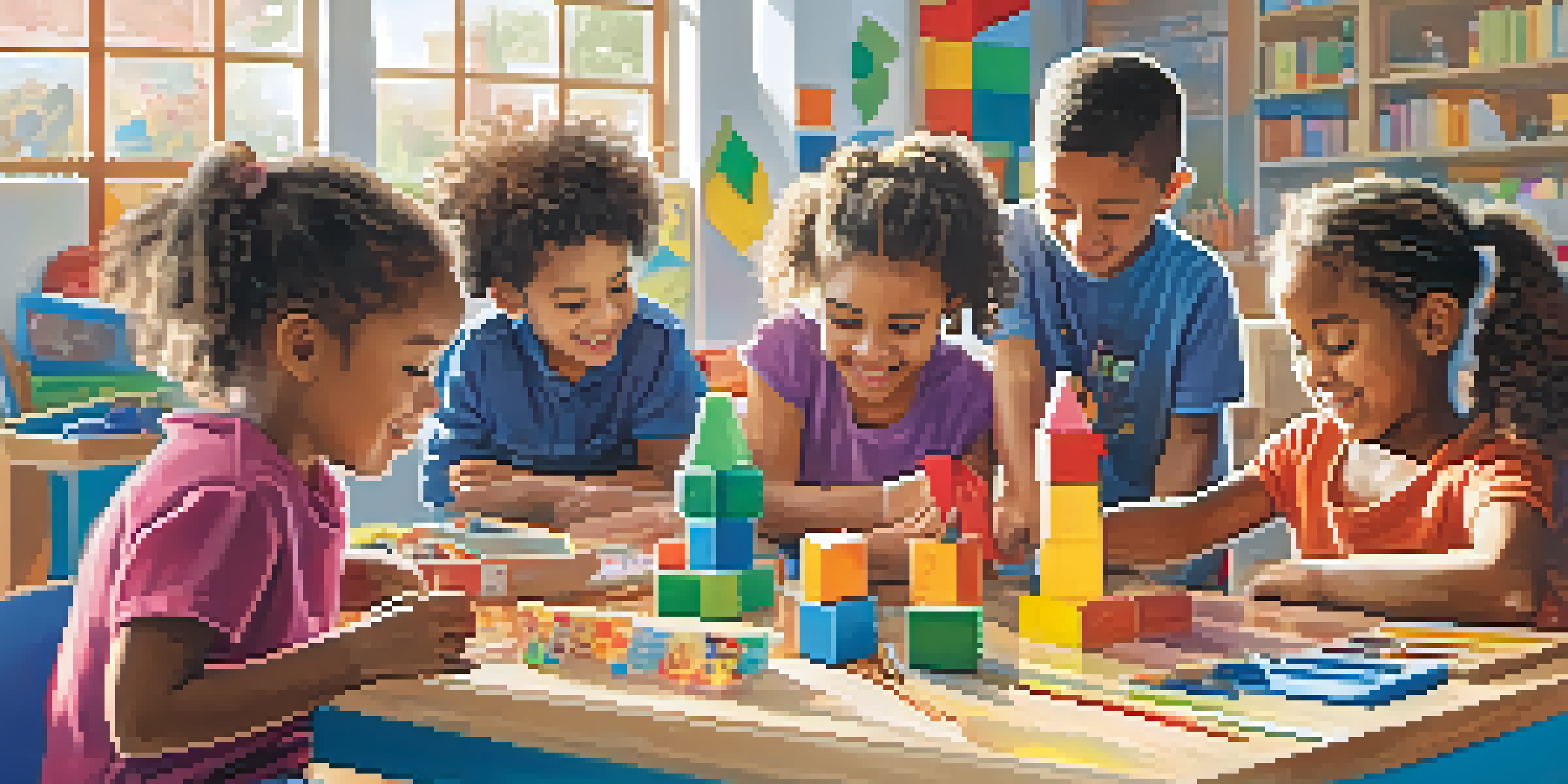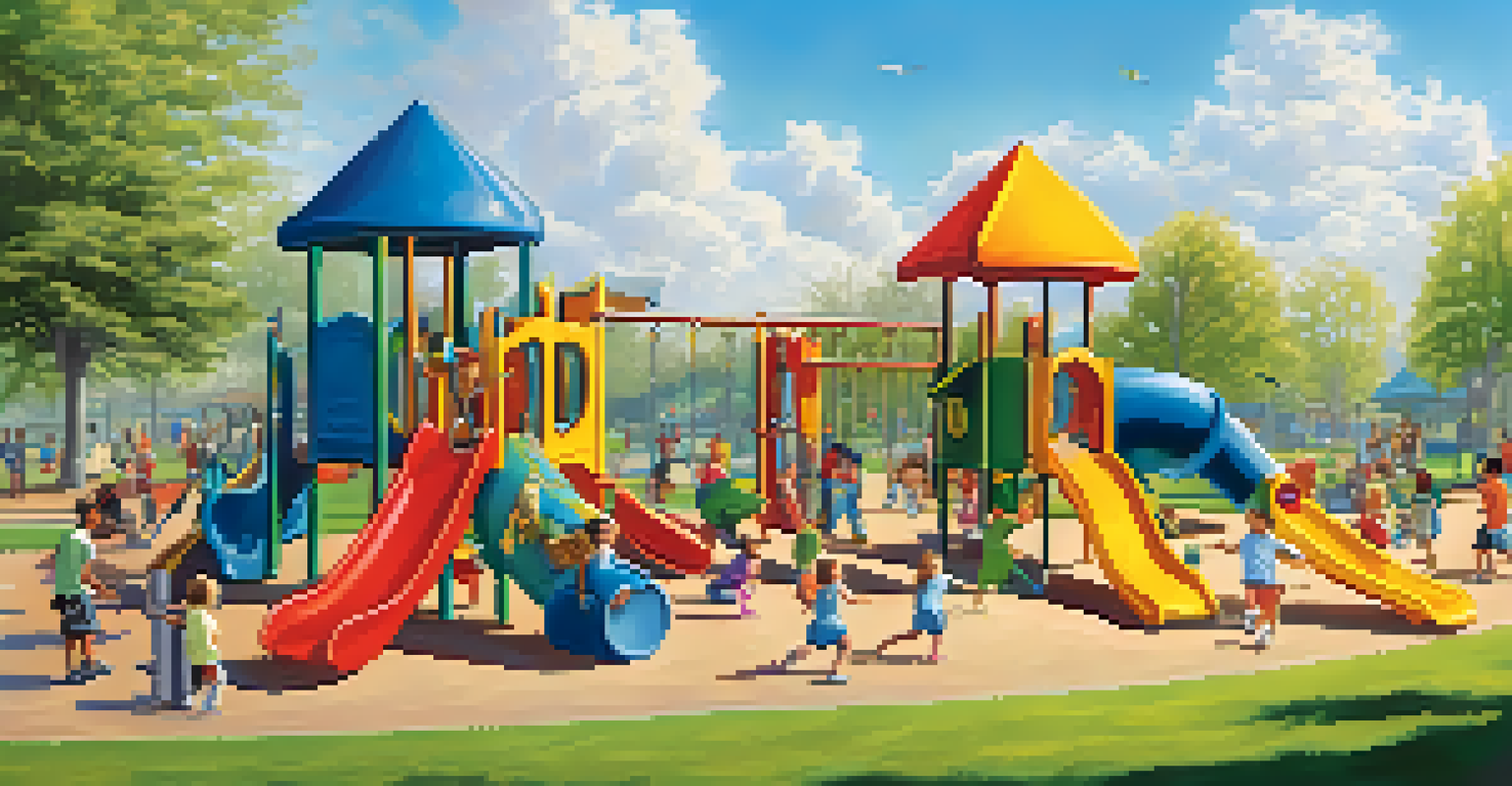Exploring the Benefits of Play-Based Learning in Early Years

Understanding Play-Based Learning in Early Education
Play-based learning is an educational approach that uses play as a primary method for children to learn. It emphasizes the importance of engaging in activities that are enjoyable and meaningful to the child. This method creates a natural environment for children to explore, experiment, and discover new concepts while having fun.
Play is the highest form of research.
In this context, play isn’t just a pastime; it’s a powerful tool that drives cognitive, emotional, and social development. For example, when children engage in role-playing, they enhance their language skills and learn about social roles. By exploring different scenarios through play, kids develop critical thinking and problem-solving abilities without even realizing it.
This approach aligns with how children naturally learn, making it a more effective method than traditional rote learning. By fostering curiosity and creativity, play-based learning nurtures a lifelong love for learning, which is essential for their future educational journeys.
Nurturing Social Skills Through Collaborative Play
One of the standout benefits of play-based learning is its ability to foster social skills among young learners. When children play together, they learn to communicate, negotiate, and cooperate with one another. These interactions are vital for developing empathy and understanding diverse perspectives.

For instance, during group activities, children must share resources and take turns, which teaches them patience and respect for others. As they navigate conflicts or disagreements in their play, they practice resolving issues in a constructive manner. These skills are invaluable as they transition into more structured social environments like school.
Play Fuels Holistic Child Development
Play-based learning enhances cognitive, emotional, social, and physical skills, creating a well-rounded foundation for children.
Moreover, play allows children to form friendships based on shared interests and collaborative efforts. This sense of belonging and teamwork not only enriches their play experiences but also boosts their emotional well-being, setting a strong foundation for future relationships.
Enhancing Cognitive Development Through Exploration
Cognitive development is another area where play-based learning shines. When children engage in play, they are not just having fun; they are also developing critical thinking and problem-solving skills. For example, building with blocks involves planning, spatial awareness, and understanding cause and effect as they create and experiment.
Children learn as they play. Most importantly, in play, children learn how to learn.
Additionally, open-ended play scenarios encourage children to think creatively and make decisions. Whether they’re figuring out how to construct a tower that won’t topple or deciding the rules of a game, they are constantly exercising their minds. This active engagement promotes cognitive flexibility, which is crucial for academic success.
Research suggests that children who participate in play-based learning demonstrate better performance in tasks requiring reasoning and comprehension. By allowing children to take the lead in their learning, we empower them to become independent thinkers who are capable of tackling challenges head-on.
Fostering Emotional Intelligence Through Play
Emotional intelligence, the ability to understand and manage emotions, is a critical skill that can be nurtured through play-based learning. When children engage in imaginative play, they often explore various emotions and situations, helping them identify and articulate their feelings. For instance, pretending to be a doctor or a teacher allows children to navigate the emotions associated with those roles.
Furthermore, play provides a safe space for children to express themselves and practice emotional regulation. During play, they may experience joy, frustration, or disappointment, and through these experiences, they learn how to cope with different emotional responses. This practice is essential for their overall emotional development and resilience.
Social Skills Blossom Through Play
Collaborative play fosters communication, empathy, and conflict resolution skills among young learners.
By developing emotional intelligence in early childhood, we equip children with the tools to manage their feelings and build healthy relationships. This foundation not only contributes to their well-being but also enhances their ability to navigate the complexities of social interactions throughout their lives.
Encouraging Physical Development Through Active Play
Physical development is another important aspect of early childhood learning that benefits from play-based approaches. Active play, whether it’s running, climbing, or jumping, helps improve gross motor skills and overall physical health. These activities not only promote fitness but also enhance coordination and balance.
Moreover, fine motor skills are cultivated through play that involves manipulation, such as arts and crafts or building with small blocks. These activities refine hand-eye coordination and dexterity, which are crucial for tasks like writing and self-care as children grow. Engaging in varied physical play also helps children understand their bodies and develop confidence in their physical abilities.
Incorporating movement into learning experiences encourages a holistic approach to education. When children are physically active, they are not only benefiting their bodies but also their minds, as movement has been shown to enhance cognitive function and concentration.
Creating a Lifelong Love for Learning
Play-based learning instills a passion for discovery and exploration that can last a lifetime. When education is intertwined with play, children associate learning with enjoyment, making them more eager and enthusiastic students. This positive attitude towards learning can significantly impact their academic trajectories and overall outlook on education.
For example, children who experience engaging, playful learning environments are more likely to pursue knowledge independently. They become curious researchers, asking questions and seeking answers on their own. This intrinsic motivation is essential for lifelong learning, as it encourages children to explore new subjects and skills as they grow.
Love for Learning Through Engagement
Integrating play into education encourages a lifelong passion for discovery, making learning enjoyable and memorable.
Moreover, when children are encouraged to learn through play, they often retain information better. The experiences they gain during play can lead to deeper understanding and memory retention, making it easier for them to connect new knowledge to what they already know.
Implementing Play-Based Learning in Early Years
To effectively implement play-based learning, educators and parents need to create environments that foster exploration and creativity. This can be achieved by providing a variety of materials and resources that encourage imaginative play. For instance, setting up a themed play area with costumes, props, and creative materials can stimulate children's imaginations.
Additionally, it’s important to allow children the freedom to choose their play activities. Guidance from adults should be minimal and focused on facilitating rather than directing play. By observing children's interests and following their lead, caregivers can create meaningful learning experiences that resonate with each child's unique preferences.

Lastly, collaboration between educators, parents, and the community is vital. Sharing ideas and resources can help create a supportive network that enhances play-based learning experiences. By working together, we can ensure that children have ample opportunities to learn through play, setting them on a path to success.
The Future of Play-Based Learning in Education
The future of education is increasingly recognizing the importance of play-based learning. As research continues to highlight its benefits, more educators and institutions are incorporating play into their curricula. This shift reflects a growing understanding that children learn best in environments that prioritize engagement and creativity.
Looking ahead, it’s crucial to advocate for policies that support play-based learning in early childhood education. This includes training for educators on how to implement these methods effectively and providing resources that facilitate a playful learning environment. By prioritizing play, we can cultivate a generation of learners who are not only knowledgeable but also innovative and adaptable.
As we continue to embrace play-based learning, we must remember that the goal is to nurture well-rounded individuals who are prepared for the challenges of the future. By valuing play as a fundamental component of education, we can help shape a brighter, more creative world for our children.